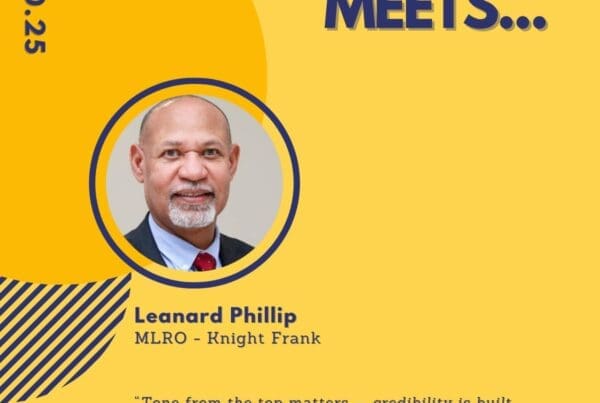Our latest article in the MERJE Meets series comes from beacon of simplicity and innovation in risk management, Ryan Swann.
As the Founder of RiskSmart, Ryan brings forth a wealth of experience and a relentless drive to revolutionise how businesses navigate risk. With a distinguished career spanning over two decades, Ryan’s journey from Assistant Legal Adviser at DWF to his current position has been marked by a deep understanding of regulatory compliance and a passion for leveraging technology to empower businesses to manage risk with confidence.
Recognising the challenges faced by risk management teams thanks to his background across risk, compliance, and legal roles, including Head of Risk & Compliance, General Counsel, and Chief Risk & Compliance Officer at Think Money Group, Ryan embarked on a mission to streamline risk management processes. This has ultimately given rise to RiskSmart—a risk technology company dedicated to simplifying, centralising, and digitalising risk management.
Join us in this exclusive Q&A session as we delve deeper into Ryan’s journey, insights, and vision for the future of risk management in the digital age.
A few years ago you wrote an article, The Future Chief Risk Officer, in which you touched upon the main challenges CROs saw at that time. These included lack of structured data, delayed reporting, and lacking the time/budget/skills for data analysis. How has this changed in recent years?
It’s true, those challenges – siloed data, lagging reports, and limited resources – were real roadblocks back then. But thankfully, things are evolving.
I see a shift towards building a strong risk culture, with user-friendly policies and systems that everyone can understand. This makes risk management less of a chore and more of a collaborative effort.
Additionally, operational resilience and business continuity are top priorities, which resonates deeply with me. We live in uncertain times, and having robust plans in place is crucial. Data connectivity is key. The more we can connect different risk and compliance functions, the clearer picture we get, and the better we can manage it. It’s all about breaking down silos and building bridges.
If I had to put the key emerging trends I feel will impact Chief Risk Officers in the coming year in a list, it would look like this:
-
Reducing technical complexity
-
Operational resilience and business continuity plans (BCP) are a top priority
-
CROs need an integrated and unified view of risk and compliance
-
Balancing work life and personal life will be paramount
The article also talked about how the CRO role needed to evolve to effectively lead the Risk team against a backdrop of increased digitisation and greater pressures to reduce costs and do more with less. What advice would you give to Chief Risk Officers today?
Two words: unity and adaptability.
Stay ahead of the curve by encouraging your team to embrace new technologies and emerging threats. Foster collaboration across departments, and don’t be afraid to automate where possible. Streamlined processes and automation free up your team’s time for the really important stuff – strategic thinking and proactive risk management.
AI is a hot topic across all industries at the moment. How do you think it will impact GRC business functions?
Generative AI is a game-changer. It can automate report generation, policy creation, and even regulatory document drafting. Imagine the time saved!
But it’s not just about saving time, it’s about gaining deeper insights. AI can help us run simulations and scenario planning, allowing us to anticipate and prepare for new risks in a way that was never possible before.
However, it’s about using it for the right things. We talk about the art and the science of risk management and both are equally important. AI will make certain parts of the role easier by automating some manual tasks but it will never remove the need to build relationships across the business and get out and understand what’s really going on.
The human element – judgement, critical thinking, and relationship building – will always be essential.
2024 is due to see some major regulation updates – what are the key changes for Governance, Risk, and Compliance (GRC) leaders to look out for?
Keep an eye on the EU AI Act, DORA, PCI 4.0, and GDPR updates. Within financial services specifically, operational resilience, ESG, and consumer duty are hot topics. It’s a lot to juggle, but having the right technology and a proactive approach can make all the difference.
Why RiskSmart?
We built RiskSmart with CROs in mind. It’s not just software, it’s an extension of your team, providing the technology you need to ditch the biggest pain point – lack of visibility. From risk and control to compliance and internal policies, RiskSmart empowers you to transform your risk management approach.
What would you say to someone who is unsure about taking the leap and investing in risk technology for their business?
Investing in technology always takes time and consideration. For CROs, making the decision on whether or not to embrace these investments can be a significant undertaking.
From my experience over the past few years, I can identify five key reasons why taking the leap is not only beneficial but necessary:
-
Enhanced Efficiency & Scalability: Modern risk technologies focus on automating processes, reducing manual effort, and eliminating human error. Moreover, RiskTech allows teams to focus on higher-value tasks, such as increasing scalability as your organisation grows.
-
Improved Accuracy: From risk assessments to predictive analytics, risk technologies help CROs improve accuracy across the board. In a time when new regulations are a dime a dozen, this heightened accuracy is vital for winning the trust of stakeholders.
-
Real-Time Insights: RiskTech can provide real-time data analytics, enabling CROs to make informed decisions and respond to incidents promptly. Adopting advanced risk
technology can differentiate an organisation by demonstrating a commitment to robust risk management. -
Compliance Assurance: Compliance with today’s evolving regulatory standards requires advanced tools for monitoring and reporting risk. Risk technology provides Chief Risk Officers with a simplified means of completing necessary assessments and reports.
-
Cost Savings: While there are initial investment costs, risk technology ultimately leads to long-term cost savings through increased efficiency and effectiveness. For CROs hoping to optimise budgets in 2024, adopting new technologies is a chief objective.
Quick Fire
If you instantaneously gain a new skill, what would it be?
More time!
Favourite podcast?
Diary of a CEO. It’s great to hear what others have got right and wrong.
Dream holiday destination?
Japan. Maybe it’s because the kids love sushi, but it’s always been somewhere I have wanted to see.
Many thanks to Ryan for collaborating with us on this article! If you’re curious about RiskSmart, head to their website to find out more about simplifying your risk management.
Related Articles
MERJE Meets: Matt Tavener – Head of Compliance & MLRO
How much does executive search cost?
Case Study: Director of Risk & Compliance, Real Estate Fund Management







